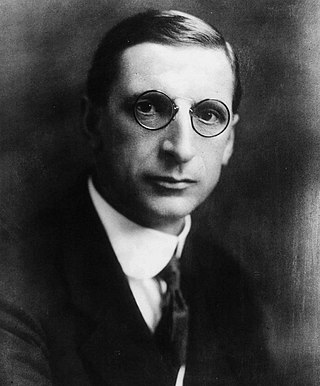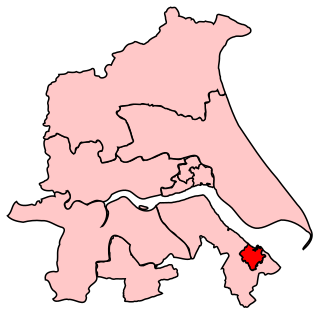Related Research Articles

The Ulster Unionist Party (UUP) is a unionist political party in Northern Ireland. The party was founded as the Ulster Unionist Council in 1905, emerging from the Irish Unionist Alliance in Ulster. Under Edward Carson, it led unionist opposition to the Irish Home Rule movement. Following the partition of Ireland, it was the governing party of Northern Ireland between 1921 and 1972. It was supported by most unionist voters throughout the conflict known as the Troubles, during which time it was often referred to as the Official Unionist Party (OUP).

The Parliament of Northern Ireland was the home rule legislature of Northern Ireland, created under the Government of Ireland Act 1920, which sat from 7 June 1921 to 30 March 1972, when it was suspended because of its inability to restore order during The Troubles, resulting in the introduction of Direct Rule. It was abolished under the Northern Ireland Constitution Act 1973.

The 1918 Irish general election was the part of the 1918 United Kingdom general election which took place in Ireland. It is a key moment in modern Irish history because it saw the overwhelming defeat of the moderate nationalist Irish Parliamentary Party (IPP), which had dominated the Irish political landscape since the 1880s, and a landslide victory for the radical Sinn Féin party. Sinn Féin had never previously stood in a general election, but had won six seats in by-elections in 1917–18. The party had vowed in its manifesto to establish an independent Irish Republic. In Ulster, however, the Unionist Party was the most successful party.

The Northern Ireland Assembly, often referred to by the metonym Stormont, is the devolved legislature of Northern Ireland. It has power to legislate in a wide range of areas that are not explicitly reserved to the Parliament of the United Kingdom, and to appoint the Northern Ireland Executive. It sits at Parliament Buildings at Stormont in Belfast.

The 1998 Northern Ireland Assembly election took place on Thursday, 25 June 1998. This was the first election to the new devolved Northern Ireland Assembly. Six members from each of Northern Ireland's eighteen Westminster Parliamentary constituencies were elected by single transferable vote, giving a total of 108 Members of the Legislative Assembly (MLAs).

The 2003 Northern Ireland Assembly election was held on Wednesday, 26 November 2003, after being suspended for just over a year. It was the second election to take place since the devolved assembly was established in 1998. Each of Northern Ireland's eighteen Westminster Parliamentary constituencies elected six members by single transferable vote, giving a total of 108 Members of the Legislative Assembly (MLAs). The election was contested by 18 parties and many independent candidates.

The Good Friday Agreement referendum, 1998 was a referendum held in Northern Ireland over whether there was support for the Good Friday Agreement. The result was a majority (71.1%) in favour. A simultaneous referendum held in the Republic of Ireland produced an even larger majority (94.4%) in favour.

North Down is a parliamentary constituency in the United Kingdom House of Commons. The current MP is Stephen Farry of the Alliance Party. Farry was elected to the position in the 2019 general election, replacing the incumbent Sylvia Hermon. Hermon had held the position since being elected to it in the 2001 general election, but chose not to contest in 2019.
Sir Denis Stanislaus Henry, 1st Baronet,, was an Irish lawyer and politician who became the first Lord Chief Justice of Northern Ireland.

Sir Thomas Wallace Russell, 1st Baronet, was an Irish politician and agrarian agitator. Born at Cupar, Fife, Scotland, he moved to County Tyrone at the age of eighteen. He was secretary and parliamentary agent of the Irish temperance movement and became well known as an anti-alcohol campaigner and proprietor of a Temperance Hotel in Dublin.
Lieutenant-Colonel Sir Ronald Deane Ross, 2nd Baronet was an Ulster Unionist Northern Irish Member of Parliament (MP).
The 1913 Altrincham by-election was a Parliamentary by-election held on 28 May 1913. The constituency returned one Member of Parliament (MP) to the House of Commons of the United Kingdom, elected by the first past the post voting system.
The 1905 Buteshire by-election was a by-election held on 3 March 1905 for the British House of Commons constituency of Buteshire.

The 2016 Northern Ireland Assembly election was held on Thursday, 5 May 2016. It was the fifth election to take place since the devolved assembly was established in 1998. 1,281,595 individuals were registered to vote in the election. Turnout in the 2016 Assembly election was 703,744 (54.9%), a decline of less than one percentage point from the previous Assembly Election in 2011, but down 15 percentage points from the first election to the Assembly held in 1998.

The 1914 Great Grimsby by-election was a Parliamentary by-election held on 12 May 1914. The constituency returned one Member of Parliament (MP) to the House of Commons of the United Kingdom, elected by the first past the post voting system. It was one of the last by-election contests to take place before the outbreak of the Great War, and provided a good indicator of how the main parties would have performed at an anticipated general election for 1914 or 1915.
The 1916 South Londonderry by-election was held on 22 May 1916. The by-election was held due to the resignation of the incumbent Irish Unionist MP, John Gordon. It was won by the Irish Unionist candidate Denis Henry.
The 1911 North Tyrone by-election was a Parliamentary by-election. North Tyrone returned one Member of Parliament (MP) to the House of Commons of the United Kingdom, elected by the first past the post voting system. The by-election was held on 6 October 1911.
The 1907 Belfast North by-election was held on 17 April 1907. The by-election was held due to the death of the incumbent Irish Unionist MP, Daniel Dixon. It was won by the Irish Unionist candidate George Clark. North Belfast had previously been a marginal seat with the Labour candidate, William Walker, coming within 500 votes of winning on the two previous occasions. In order to win over Protestant voters, Walker made clear that he was opposed to Home Rule
References
- ↑ "Leigh Rayment - Commons". leighrayment.com. Archived from the original on 7 June 2008.
{{cite web}}: CS1 maint: unfit URL (link) - ↑ Walker, B.M., ed. (1978). Parliamentary Election Results in Ireland, 1801-1922. Dublin: Royal Irish Academy. ISBN 0901714127.